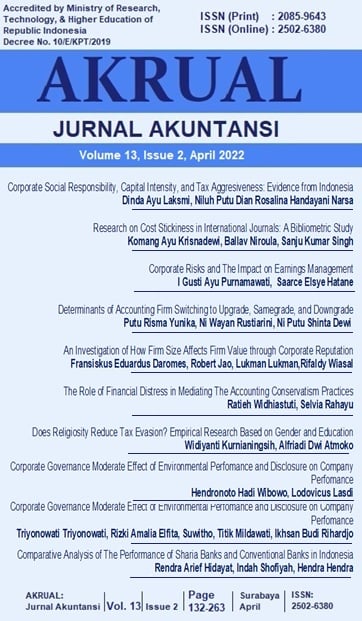Corporate Social Responsibility, Capital Intensity, and Tax Aggresiveness: Evidence from Indonesia
DOI:
https://doi.org/10.26740/jaj.v13n2.p132-143Keywords:
capital intensity, coporate social responsibility, tax aggresivenessAbstract
Abstract
Many empirical evidences regarding the relationship between Corporate Social Responsibility (CSR) and Tax Aggresiveness (TA) had shown inconsistency, thus, there is a need to reconcile those findings by utilize moderating variables which in turn hopefully will provide a more specific explanation regarding the mechanism behind it. This study aims to obtain empirical evidence related to the relationship between CSR and TA and also the relationship between CSR and TA with capital intensity as a moderator. CSR in this study was measured using the index from Global Reporting Intiatives (GRI) version 4. The sample used in this study was 384 manufacturing companies listed on the Indonesia Stock Exchange in 2015-2019. The data obtained were analyzed using SPSS with multiple linear regression analysis and moderated regression analysis. The results show that CSR is negatively related to TA. Furthermore it is also found that capital intensity has a role as pure moderator variable that can weaken the negative relationship between CSR and TA, or in other words the interaction between CSR and capital intensity tends to cause company to engage in TA
References
Handayani, H., Soerono, A. N., & Ramdhani, D. (2018). Pengaruh Agresivitas Pajak Terhadap Corporate Social Responsibility Dengan Variabel Kontrol Return on Asset Dan Leverage. Tirtayasa Ekonomika, 13(1), 162. https://doi.org/10.35448/jte.v13i1.4236
Makhfudloh. F., Herawati. N., & Wulandari. A. (2018). Pengaruh Corporate Social Responsibility terhadap Perencanaan Agresivitas Pajak. Jurnal Akuntansi Dan Bisnis, 18(1), 48. https://doi.org/10.20961/jab.v18i1.235
Sharma, S., Durand, R. M., & Gur-Arie, O. (1981). Identification and Analysis of Moderator Variables. Journal of Marketing Research, 18(3), 291. https://doi.org/10.2307/3150970
Sudana. I. M.. (2011). Manajemen Keuangan Perusahaan Teori & Praktek. Erlangga
Vacca. A., Iazzi. A., & Vrontis. D. (2020). The Role of Gender Diversity on Tax Aggressiveness and Corporate Social Responsibility : Evidence from Italian Listed Companies. Sustainability, 12(5):2007, 1-15
Downloads
Published
How to Cite
Issue
Section
License
Copyright (c) 2021 AKRUAL: Jurnal Akuntansi

This work is licensed under a Creative Commons Attribution-NonCommercial 4.0 International License.
 Abstract views: 1718
,
Abstract views: 1718
, PDF Downloads: 2174
PDF Downloads: 2174


















